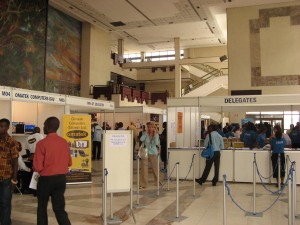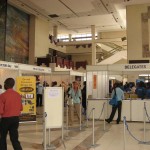The eLearning Africa 2010 Conference planning seems to be in full swing. This year it will be in Lusaka, Zambia, on May 26-28, 2010. In general, this conference has been a big success and there does seem to be significant growth each year.
eLearning Africa 2010 is gearing up for another exciting conference filled with rigorous debate, discussion, networking and knowledge-sharing among practitioners and policymakers from all over the world.
This year’s conference has four main themes (take from the eLearning Africa website):
- A: CONCEPTUAL: these themes focus on the theoretical and conceptual models which guide our practical work and experience with technologies and learning.
- B: SECTORAL: these themes focus mainly on developments in a specific sector – from education, health and security to agriculture, development and the corporate world.
- C: POLICY, PLANNING & DESIGN: these themes relate to policy at all levels, including the design and implementation of systems, policies or processes related to learning with technologies.
- D: SOLUTIONS & TECHNICAL INNOVATIONS: these themes draw on practical experiences with the implementation of technology solutions and with innovations.
Thematically, that is an illustrative stacking. Notice the technical solutions are presented last as a step in a process. In my mind, they are last in importance as well as many problems in this community can be solved conceptually with solutions designed for specific communities (Sectoral). The rest is a logical (and ideally transparent) policy and planning structure at the higher levels.
Also encouraging is the general collaborative atmosphere that seems to be coming out of these experiments with ICT and eLearning in Africa. One of the stories mentioned in the news portal for eLearning Africa is the following:
With a geographic base in nine southern African countries, financial underpinnings of about fifteen million Units of Account (1 UA = 1 US$1.48) from the African Development Fund, and a mature development strategy, the Open and Distance Learning Project launched by the Southern African Development Organization (SADC) secretariat in 2007 provides a paradigm for how a large-scale capacity-building effort should come into being. The project members are Angola, the Democratic Republic of Congo, Lesotho, Malawi, Mozambique, Tanzania, Zambia and Zimbabwe. Madagascar, nominally a member, too, has been suspended from the SADC due to political uncertainties and is currently not actively involved. At eLA, Project Advisor Professor Richard Siaciwena from Botswana will provide up-to-date information on the project and put the entire process of development forward for discussion.
A developmental project discussing lessons learned (presumably their failures as much as their successes)? You would be hard pressed to find this type of collaborative openness in many of the developmental communities in New York, let alone in Zambia. But there it is and it is promising.
As I mentioned in a few previous posts, development work in Africa (and in other areas) must escape the cycle of redundant activities and research. Often, this is simply due to not knowing that work has already been done or that research has already been produced towards the same end. These types of lessons learned demonstrations, especially one on such a large scale as SADC, are critical in fostering that openness, that culture of collaborative enterprise. At the very least, they go a long way in avoiding waste.

I was most impressed with the eLearning Africa Conference I attended in Accra, Ghana, in 2008. It was well organized and sober (generally) on its mandates and predictions for the future of ICT on the African continent. There were a few vendors that seemed to miss the point (at least some of the specific limitations inherent to running ICT in certain environments), but it was all revealing for the audience as well as to identify a community of practice. Major figures have started to emerge from these conferences and others have identified the network of practitioners.
It is highly recommended. Also, I have been to Lusaka and it is nice. I actually had a chance to speak at the Mulungushi International Conference Centre, where eLearning 2010 will be held.
If you are lucky, you will get to see these eland that wander all over the grounds of the Conference Centre. The one above was about twenty feet from the front door. Beautiful animals, all right in the middle of the city.

